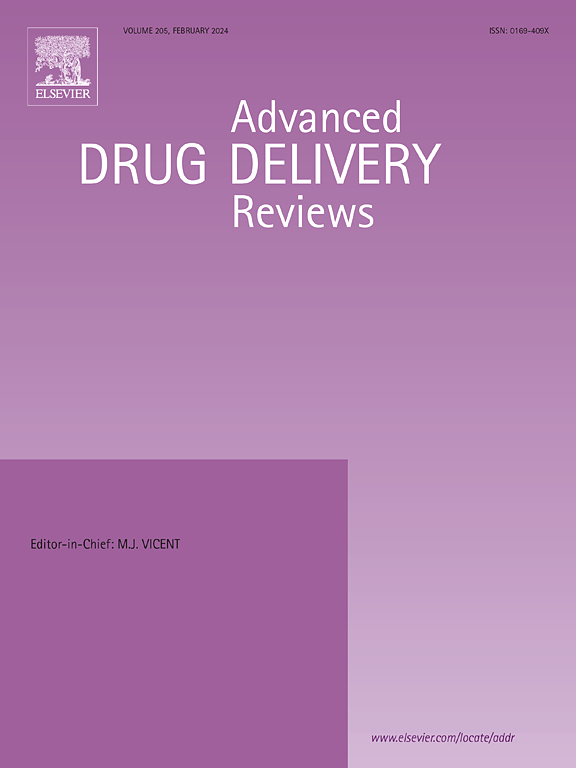Antibody-drug conjugates as multimodal therapies against hard-to-treat cancers
IF 17.6
1区 医学
Q1 PHARMACOLOGY & PHARMACY
引用次数: 0
Abstract
Antibody-drug conjugates (ADCs) are rapidly emerging as an effective multimodal approach for the targeted delivery of cytotoxic small molecules to tumours with aberrantly overexpressed markers. Recent advances in antibody engineering and the emergence of highly potent cytotoxic drugs have created unprecedented scope for precision-based design of novel ADCs against chemotherapy-resistant tumours. However, their clinical translation faces the challenge of balancing efficacy and toxicity. Innovations in conjugation chemistries and antibody engineering are addressing these challenges, yet a more comprehensive in vitro − in vivo correlation is critical to accelerating their clinical translation. This review examines the latest advancements in ADC-based therapies for hard-to-treat cancers, focusing on design considerations that define their efficacy in breast cancer and glioblastoma multiforme. Additionally, we highlight current challenges in reconciling ADC quality attributes influencing their in vivo performance, which impedes their clinical translation. By integrating cutting-edge advancements in antibody engineering with industrial insights, this review casts a spotlight on the pivotal role of ADCs as a powerful biomolecular toolbox for delivering next-generation therapies to address unmet clinical need.


抗体-药物结合作为多模式治疗难以治疗的癌症
抗体-药物偶联物(adc)正迅速成为一种有效的多模式方法,用于靶向递送细胞毒性小分子到具有异常过表达标记物的肿瘤。抗体工程的最新进展和高效细胞毒药物的出现,为针对化疗耐药肿瘤的新型adc的精确设计创造了前所未有的空间。然而,它们的临床翻译面临着平衡疗效和毒性的挑战。偶联化学和抗体工程的创新正在解决这些挑战,但更全面的体外-体内相关性对于加速其临床转化至关重要。本文综述了基于adc的治疗难以治疗的癌症的最新进展,重点是确定其对乳腺癌和多形性胶质母细胞瘤疗效的设计考虑。此外,我们强调了当前在协调影响其体内性能的ADC质量属性方面的挑战,这阻碍了它们的临床转化。通过将抗体工程的前沿进展与工业见解相结合,本综述聚焦于adc作为提供下一代治疗方法以解决未满足临床需求的强大生物分子工具箱的关键作用。
本文章由计算机程序翻译,如有差异,请以英文原文为准。
求助全文
约1分钟内获得全文
求助全文
来源期刊
CiteScore
28.10
自引率
5.00%
发文量
294
审稿时长
15.1 weeks
期刊介绍:
The aim of the Journal is to provide a forum for the critical analysis of advanced drug and gene delivery systems and their applications in human and veterinary medicine. The Journal has a broad scope, covering the key issues for effective drug and gene delivery, from administration to site-specific delivery.
In general, the Journal publishes review articles in a Theme Issue format. Each Theme Issue provides a comprehensive and critical examination of current and emerging research on the design and development of advanced drug and gene delivery systems and their application to experimental and clinical therapeutics. The goal is to illustrate the pivotal role of a multidisciplinary approach to modern drug delivery, encompassing the application of sound biological and physicochemical principles to the engineering of drug delivery systems to meet the therapeutic need at hand. Importantly the Editorial Team of ADDR asks that the authors effectively window the extensive volume of literature, pick the important contributions and explain their importance, produce a forward looking identification of the challenges facing the field and produce a Conclusions section with expert recommendations to address the issues.

 求助内容:
求助内容: 应助结果提醒方式:
应助结果提醒方式:


